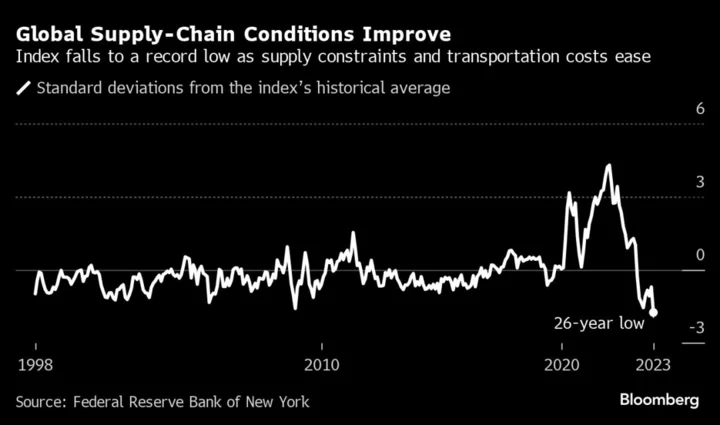Former Treasury Secretary Lawrence Summers said that “transitory factors” have been one element in a faster slowdown in US inflation than he anticipated.
“Given how strong the economy has been, there’s still a surprise in what’s happened to inflation,” Summers said on Bloomberg Television’s Wall Street Week with David Westin. That has in part to do with “transitory factors that were pushing inflation up from bottlenecks that are now mean reverting and are pushing inflation down,” he said.
Summers spoke a day after the October consumer price index report showed a smaller increase in core inflation, which excludes food and energy costs, than forecast. The core CPI was up 4% last month from a year before, down from a peak of 6.6% in September last year.
The term “transitory” became charged in the debate over US inflation after consumer prices showed sustained outsize increases in 2022 — against the anticipation of Treasury Secretary Janet Yellen and Federal Reserve Chair Jerome Powell in 2021 that a pickup in inflation would prove short-lived. Both abandoned the characterization.
Related: Yellen Warns Inflation to Stay High, Recants Again on Transitory
Summers, a Harvard University professor and paid contributor to Bloomberg TV, was prominent in predicting a surge in inflation and in criticizing the arguments of “Team Transitory.”
On Wednesday, he said he had “thought a lot about” the slowdown in inflation that has ensued over the past year. The first key contributor he cited was tighter Fed policy than expected. Powell and his colleagues mounted the most aggressive increases in the benchmark interest rate in decades.
“That doesn’t mean inflation fears were unwarranted — it means that people took the fear seriously, which was good,” Summers said.
Summers still cautioned that the path to getting inflation back to the Fed’s 2% target may prove more challenging than investors assume. And he reiterated that he still doesn’t see a “soft landing” in the economy, where price gains return to 2% without a significant economic downturn.
For the first half of 2024, the odds of a recession are just 20% to 25%, given factors including the recent strength in inflation-adjusted incomes, he said. But “there’s been a little bit of prematurity in some of the declarations of victory,” he said.
The surge in retail stocks this week on hopes that a recession is now off the table don’t “seem wise as a market response,” he said. “Some people may have too much confidence in Mother Fed.”
“I’m not sure the inflation figures over the next two years are going to be quite as favorable as the market is expecting — especially in light of the geopolitical risks around oil and some other commodities,” the former Treasury chief said.

